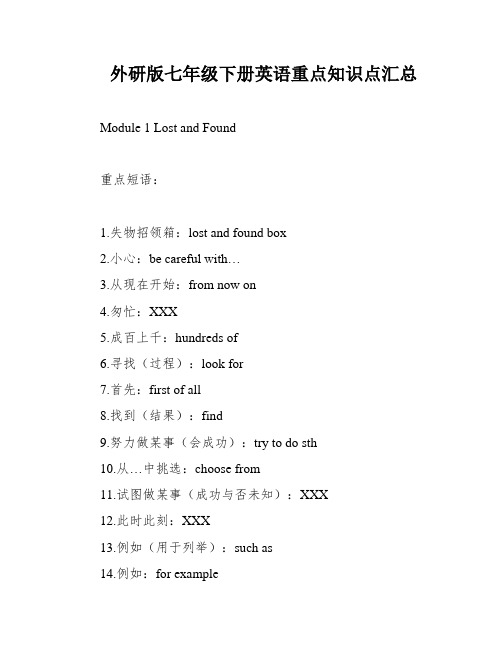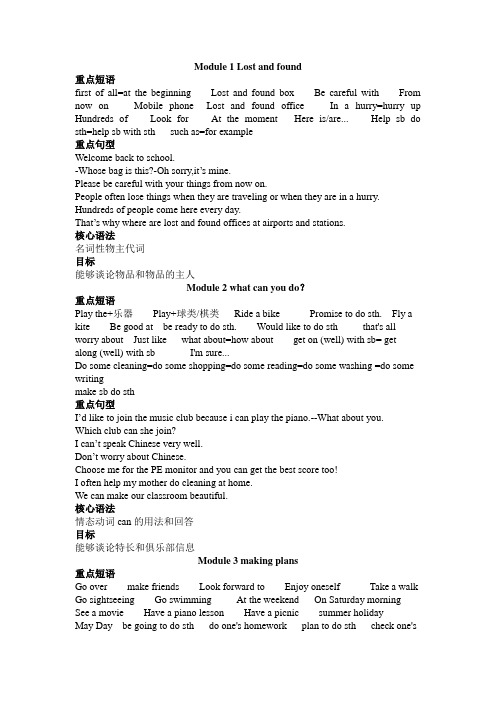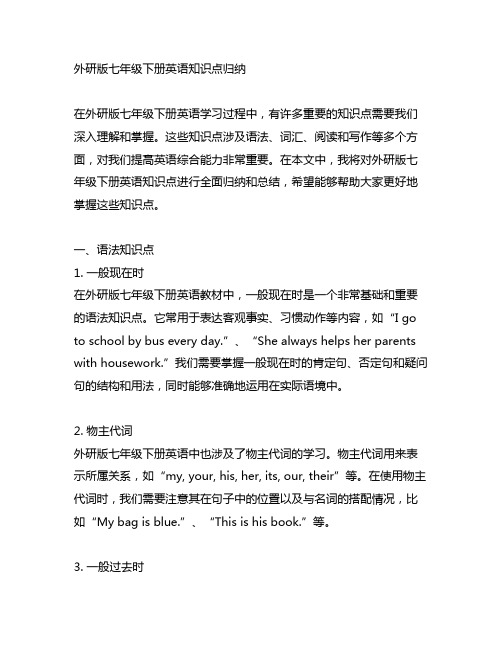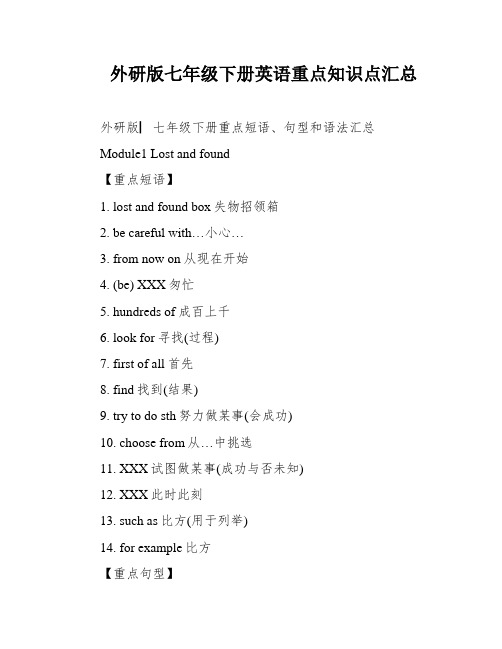外研版七年级下册知识点总结
外研版七年级下册英语重点知识点汇总

外研版七年级下册英语重点知识点汇总Module 1 Lost and FoundIn this module。
we learn some XXX related to lost and found items。
Firstly。
we have the "lost and found box," which is aplace where lost items are kept until they are claimed。
We also learn to be careful with our belongings and to look for lost items。
From now on。
we should try to be more XXX.If we do lose something。
we can try to find it by looking around and asking others for help。
It's XXX hundreds of items are lost every day。
so we should be XXX in our search。
First of all。
we should check the lost and found box to see if our item has been turned in。
If we don't find it there。
we can try to ask around and see if anyone has seen it.When looking for lost items。
we can choose from different methods。
We can try to find it ourselves。
or we can ask othersfor help。
外研版七年级下册英语重点知识点汇总

外研版七年级下册英语重点知识点汇总Module 1 Lost and Found重点短语:1.失物招领箱:lost and found box2.小心:be careful with…3.从现在开始:from now on4.匆忙:XXX5.成百上千:hundreds of6.寻找(过程):look for7.首先:first of all8.找到(结果):find9.努力做某事(会成功):try to do sth10.从…中挑选:choose from11.试图做某事(成功与否未知):XXX12.此时此刻:XXX13.例如(用于列举):such as14.例如:for example重点句型:1.这是谁的 (XXX)2.帮助某人做某事:help sb do XXX.3.请小心保管…:XXX…4.欢迎来到…:e to +地点5.给某人打call sb at +电话号码语法总结:物主代词:表示所属关系的代词(…属于谁的)单数:人称形容词性物主代词名词性物主代词第一人称 my XXX第二人称 your yours第三人称 his hers its复数形容词性物主代名词性物主代第一人称 our ours第二人称 your yours第三人称 their theirs形容词性物主代词:必须和名词在一起,例如XXX,your XXX…名词性物主代词:相当于与之相对应的形容词性物主代词+名词,例如XXX.Module 2 What Can You Do?重点短语:1.与某人相处融洽:get on well with sb.2.弹钢琴:play the piano3.打乒乓球:play table XXX4.…怎么样?=how about…。
what about…5.担心…:XXX…6.擅长做某事:be good at doing sth.7.放风筝:fly a kite重点句型:无语法总结:无2.high-tech高科技的3.XXX虚拟现实4.XXX机器人仆人5.XXX太空旅行6.XXX可再生能源7.self-driving cars自动驾驶汽车8.ic engineering基因工程9.XXX寿命10.artificial intelligence人工智能重点句型】1.In the future。
外研版英语七年级下册知识点(通用8篇)

外研版英语七年级下册知识点(通用8篇)外研版英语七年级下册知识点(1)一、单词辨析wear, in 与putwear 动词,穿着,戴着。
强调穿的状态。
in 介词,后接衣服或颜色的词。
着重衣服的款式或颜色。
put on 动词,穿上,戴上,强调穿的动作,后接衣服,鞋帽。
spend 花费,度过①+ spend +时间/金钱+ on 人在上花费时间/金钱eg:I spend much time on②+ spend +时间/金钱+ ( in) doing 花费时间金钱做某事eg: I spend much time watching③+spend +时间+ with + 和某人一起度过。
eg: I spend my weekend with my二、短语forward to + / 期待某事/期待做某事eg:We are looking forward to visiting Hong 我们都很期待去香港玩。
I am looking forward to your 我很期待你的到来。
go sightseeing = do some sightseeing观光游览类似结构:go shopping 购物 go cooking 做饭go washing 洗衣服 go cleaning 打扫卫生a picnic 去野餐英语中经常用have或take, make等动词+ 组成词组。
eg:have a good time 玩得高兴 have a rest 休息一会take a walk 散步 make a presentation 做一个介绍oneself 过的愉快相当于have a good time, 在口语中,用作祈使句。
eg:I’m going to enjoy myself during the May Day 我打算在五一假期好好玩一玩。
I hope you enjoy yourself this 我希望你今晚过的愉快。
外研版七下英语知识点总结大全

外研版七下英语知识点总结大全
1.单词拼写:外研版七下英语中涉及的各种单词的正确拼写。
2.词汇释义:外研版七下英语中涉及的各种词汇的含义和用法。
3.句型转换:外研版七下英语中常见的句型转换题型,包括主动语态
和被动语态、一般现在时和一般过去时等。
4.语法知识:外研版七下英语中的语法知识点,包括名词、动词、形
容词、副词、冠词、代词、介词、连词等。
5.短语搭配:外研版七下英语中涉及的各种短语的搭配和用法。
6.句子结构:外研版七下英语中常见的句子结构,包括简单句、复合句、并列句、主从句等。
7.语篇理解:外研版七下英语中的各种语篇理解题型,包括阅读理解、完形填空等。
8.写作训练:外研版七下英语中的写作训练题型,包括书面表达、句
子填空等。
9.听力训练:外研版七下英语中的各种听力理解题型,包括听对话选
择图片、听句子选择答案等。
10.阅读训练:外研版七下英语中的阅读理解题型,包括选择题、填
空题、选择短文标题等。
11.口语表达:外研版七下英语中常见的口语表达题型,包括问答题、情景对话等。
12.语法填空:外研版七下英语中涉及的语法填空题型,包括完成句子、完成短文等。
13.同义替换:外研版七下英语中的同义替换题型,包括同义词、近义词等。
14.听音识图:外研版七下英语中的听音识图题型,包括听音选图、听音选词等。
16.听说训练:外研版七下英语中的听说训练题型,包括听音说话、听音对话等。
外研版七年级下册英语知识点

外研版七年级下册英语知识点一、动词的时态英语动词根据时间的不同,可以分为一般现在时、一般过去时和一般将来时。
1. 一般现在时:表示经常性的动作、习惯、真理、客观事实等。
例句:I often go to the park on weekends.She speaks English very well.2. 一般过去时:表示过去某个时间发生的动作或状态。
例句:He watched a movie last night.They lived in London two years ago.3. 一般将来时:表示将来要发生的动作或存在的状态。
例句:We will visit our grandparents next week.She is going to travel to France next month.二、名词的数英语中,名词的数有单数和复数两种形式。
1. 单数名词:表示一个人或事物。
例句:There is a cat in the garden.He is my friend.2. 复数名词:表示多个人或事物。
例句:There are many books on the shelf.They are my friends.三、形容词的比较级和最高级形容词的比较级和最高级可以用来比较两个或多个人或事物的程度。
1. 比较级:用于比较两个人或事物。
例句:She is taller than her sister.This book is more interesting than that one.2. 最高级:用于比较三个或三个以上的人或事物。
例句:He is the tallest boy in the class.This is the most expensive car in the showroom.四、情态动词情态动词可以用来表示说话人的态度、意愿、推测、可能性和应该性等。
1. can:表示能力和许可。
外研版 七年级下册 全册知识点梳理

Module 1 Lost and found重点短语first of all=at the beginning Lost and found box Be careful with From now on Mobile phone Lost and found office In a hurry=hurry up Hundreds of Look for At the moment Here is/are... Help sb do sth=help sb with sth such as=for example重点句型Welcome back to school.-Whose bag is this?-Oh sorry,it’s mine.Please be careful with your things from now on.People often lose things when they are traveling or when they are in a hurry. Hundreds of people come here every day.That’s why where are lost and found offices at airports and stations.核心语法名词性物主代词目标能够谈论物品和物品的主人Module 2 what can you do?重点短语Play the+乐器Play+球类/棋类Ride a bike Promise to do sth. Fly a kite Be good at be ready to do sth. Would like to do sth that's all worry about Just like what about=how about get on (well) with sb= get along (well) with sb I'm sure...Do some cleaning=do some shopping=do some reading=do some washing =do some writingmake sb do sth重点句型I’d like to join the music club because i can play the piano.--What about you.Which club can she join?I can’t speak Chinese very well.Don’t worry about Chinese.Choose me for the PE monitor and you can get the best score too!I often help my mother do cleaning at home.We can make our classroom beautiful.核心语法情态动词can的用法和回答目标能够谈论特长和俱乐部信息Module 3 making plans重点短语Go over make friends Look forward to Enjoy oneself Take a walk Go sightseeing Go swimming At the weekend On Saturday morning See a movie Have a piano lesson Have a picnic summer holidayMay Day be going to do sth do one's homework plan to do sth check one'semail重点句型What are you going to do at the weekend?On Saturday morning, I am going to check my email and do my homework.Who else is going to be there?Would you like to join us?I’m going to enjoy myself during the May Day holiday.We are also going sightseeing and going to have a picnic on the beach.核心语法be going to结构的一般将来时目标能够谈论计划Module 4 Life in the future重点短语In the future Not any more=no more be able to On the internet Make friends traffic jam By internet=on the internet Come true By 交通工具Sea level Heavy rain not only...but also..重点句型Will schools be different in the future?--In twenty years’ time, maybe there won’t be any schools!How will students learn then?--Everyone will study at home.Computers won’t be able to do that.Teachers won't use chalk on a blackboard and students won't use pens or erasers any more!Will students have a lot of homework to do?What will life be like in the future?There will be no more light rain and cold wind in springIt 'll be cheap to travel everywhere by plane, not only over land, but also over the sea or even into space.核心与法will 结构的一般将来时目标能够谈论未来的生活Module 5 shopping重点短语What color What size Try on A kilo of Way of shopping Save money One dayGo out Way of life At any time And so on Mother's Day wait a minute one ofHow much a few days what about=how about go out pay over be able toonline shopping how many重点句型What can I do for you?---I’d like to buy a T-shirt for my mum.What color dose she like?What size dose she take?May i try it on?How much are they?There are many new ways of shopping, and online shopping is one of them. Second,shopping usually takes a lot of time.Also paying over the Internet is not always safe.Online shopping is changing our way of life.You will be able to receive it anywhere in the world at any time!核心语法特殊疑问句目标能够谈论购物Module 6 around town重点词组In front of Turn left=On the left turn right=On the right Over thereGo along the street/river Opposite the park Take the underground=by underground Get off in the middle of post office why not... Excuse me famous for Take a bus=by busCan/Could you tell me the way to... Have a nice day welcome to the best way to do sthNext to between..and.. On the corner (of)... Opposite goacross=cross on a clear day be tired on the other side part of go down 重点句型Excuse me!Can you tell me the way to Wangfujing Dajie?Go across Dong Chang’an Jie , go along the street and turn left at the third street on the left.Is there a bookshop near here?How can I get there?Why not ask the policeman over there?Could you tell me how to get to the National Stadium?Take the underground to the Olympic Sports Centre, or you can take a bus or a taxi. When you are tired, the best way to see London is by boat.核心语法方位的表达方式目标能够谈论地点与场所Module 7 My past life重点短语Primary school On the east coast Movie theater Go back be strict with sb/in sthBe friendly to sb living room be born +in/on look forward to doing sthbe bored from...to... There was/were重点句型Where were you born?----I was born in a small village in Shanxi Province.What was the name of your first school?---it was Darwin Primary School.Who was your first teacher?---my first teacher was Mrs Lane. She was strict but very nice.What were they like?were you difficult in class too?There were lots of things to do in Quincy... I wasn't bored in Quincy. I was very happy there.There was a big living room with a TV,a kitchen, a bathroom and three bedrooms. One day I'll go back, and I'm looking forward to seeing my friends again.There was a small lake with fish in it. It was great to play there.核心与法一般过去时(1)目标能够谈论过去的生活Module 8 Story time重点短语Go for a walk=have a walk once upon a time=long long ago Look around Knock on the door Pick up All alone In pieces be hungry pointat/to/out At first Decide to do sth Again and again Begin with Enjoy doing sth wait a momentBe lost jump out of fairy tales all alone=lonely notice sb do/doing sth.fall asleep=be asleep重点句型...did she often go for a walk in the forest alone?...No,she didn’t.Didn’t anyone live in the house?---Goldilocks entered the house and looked into a small room.She picked up the very big bowl but she didn’t like it. The little bowl was just right. Goldilocks wanted to sit down because she was tired. It was nice and comfortable,but Goldilocks was very heavy and soon the chair was in pieces.She didn’t like the middle bed or the big bed.the small bed was very comfortable, very soon she was asleep in it.The Three Bear were all around her, so Goldilocks jumped out of bed and hurried out of the house without her basket.核心语法一般过去式(2)目标能够谈论故事Module 9 Life history重点词组Teacher’s Day Women’s Day National Day Children’s Day New year’s DayLabour Day Spring Festival Find out On a boat At the age ofMay DayAround the world Four hundred years ago Begin to do sth. In English ChristmasOn the internet as well=as well as finish school go to London in the middle ofBe worth doing sth in the 1860s an actor重点句型He left school and began work at the age of 12.What did he do?---He wrote for a newspaper.Did he stay in Missouri.When did he begin his stories?But he tool the name mark twain and became very famous.He wrote about thirty-eight plays,154short poems...in his life.Like many people 400years ago, Shakespeare’s parents didn’t learn to read or write. At school he liked plays,so he decide to be an actor when he finished school at fourteen.He became a successful actor and began to write plays.目标能谈论名人的生平Module 10 A holiday journey重点词组On holiday Two years ago A lot This year By plane At the airport The day before yesterday Have dinner Take a walk Do some shoppingFirst of all Wait in line be excited about/with sth hope to do sthPacific Ocean重点句型Where are you going on holiday, Tony?How long did it take to get there?Who was with you?So what did you do?---Well,first,we went to Disneyland,and guess what?How long did you stay there?---We stayed there for two days.I arrived by plane the day before yesterday. Aunt Joan and Uncle Pete met us at the airport.We were tired so we relaxed at home and began our tour of the city yesterday.I hope you will like it!We waited till all the lights were on.核心与法一般过去式(4)目标能够谈论度假经历Module 11 Body language重点词组Nod /shake one’s head Shake hands Three times Each other Not at allIn fact=actually Close to Arm in arm Talk to sb Move away Look atSomewhere else Say goodbye重点句型We Chinese often shake hands and smile when we meet visitors,and sometimes we nod our heads.That’s because people do different things in different countries.And do you know what Maori people in New Zealand do when they meet?How close do you stand when you talk to a friend?But in Britain many people don’t like other people to touch them at all.In some places,it isn’t polite to look at people when you talk.核心语法祈使句目标能谈论身体语言Module 12 Western music重点短语The capital of Rock/pop music In the center of All over Not only but alsoTake sb. Around Hundreds of dance music重点句型Hmm,this is western music,isn’t it?Is this by Strauss or Mozart?What a beautiful city!This is called the blue Danube.Do you like traditional western music or pop music.I’m a fan of rock music.Give us a break!In the Strauss family,there were two composers called Johann Strauss:the father and the son.His dance music made him famous all over Europe.Before he was six,he played not only the piano but also the violin.But he became very poor and died in 1791 when he was only 35.核心语法感叹句和选择疑问句目标能够谈论音乐和音乐家。
外研版七年级下册英语知识点归纳

外研版七年级下册英语知识点归纳在外研版七年级下册英语学习过程中,有许多重要的知识点需要我们深入理解和掌握。
这些知识点涉及语法、词汇、阅读和写作等多个方面,对我们提高英语综合能力非常重要。
在本文中,我将对外研版七年级下册英语知识点进行全面归纳和总结,希望能够帮助大家更好地掌握这些知识点。
一、语法知识点1. 一般现在时在外研版七年级下册英语教材中,一般现在时是一个非常基础和重要的语法知识点。
它常用于表达客观事实、习惯动作等内容,如“I go to school by bus every day.”、“She always helps her parents with housework.”我们需要掌握一般现在时的肯定句、否定句和疑问句的结构和用法,同时能够准确地运用在实际语境中。
2. 物主代词外研版七年级下册英语中也涉及了物主代词的学习。
物主代词用来表示所属关系,如“my, your, his, her, its, our, their”等。
在使用物主代词时,我们需要注意其在句子中的位置以及与名词的搭配情况,比如“My bag is blue.”、“This is his book.”等。
3. 一般过去时另外,一般过去时也是外研版七年级下册英语中一个重要的语法知识点。
一般过去时用来表示过去发生的动作或状态,常常与表示过去的时间状语连用,如“last week, yesterday”等。
我们需要掌握一般过去时的构成和用法,能够正确地运用在句子中。
二、词汇知识点1. 数词外研版七年级下册英语中还包括了数词的学习。
数词用来表示数量,有基数词和序数词之分,如“one, two, three, first, second, third”等。
在学习数词时,我们需要注意其在句子中的位置和用法,同时能够正确地读写和运用。
2. 表示时间的词汇除了数词,还有一些表示时间的词汇也是我们需要掌握的,比如“week, month, year, hour, minute, second”等。
外研版七年级下册英语重点知识点汇总

外研版七年级下册英语重点知识点汇总外研版▏七年级下册重点短语、句型和语法汇总Module1 Lost and found【重点短语】1. lost and found box失物招领箱2. be careful with…小心…3. from now on从现在开始4. (be) XXX匆忙5. hundreds of成百上千6. look for寻找(过程)7. first of all首先8. find找到(结果)9. try to do sth努力做某事(会成功)10. choose from从…中挑选11. XXX试图做某事(成功与否未知)12. XXX此时此刻13. such as比方(用于列举)14. for example比方【重点句型】1. XXX ?这是谁的…?2. help sb do XXX.XXX或人做某事3. XXX…请谨慎保管…4. Welcome to +地点欢迎来到…5. call sb at +德律风号码拨…给或人打德律风【语法总结】物主代词:透露表现所属干系的代词(…属于谁的) 单数描述词性物主代词myyourhisherits复数描述性物主代名词性物主代词词XXXyoursyourhisXXXits人称第一人称第二人称第三人称名词性物主代词oursyoursXXX形容词性物主代词:必须和名词在一起,例如XXX, your XXX...名词性物主代词:相当于与之相对应的形容词性物主代词+名词,例如XXX.Module2 What can you do?【重点短语】1. get on well with sb.与或人相处和谐2. play the piano弹钢琴3. play table XXX打乒乓球4. what about…?=how about…? ...若何?5. XXX…担心…6. be good at doing XXX.擅长做某事7. fly a kite放风筝8. that’s all仅此而已9. be ready to do sth.乐于做某事【重点句型】1.XXX?做…怎么样?2.Would like to do sth.愿意做某事3.promise to do sth.答应做某事4.play +球类名词玩…球5.play the +乐器吹奏…乐器6.do (some) +动词ing方式做…7.be XXX.确信…(语言人的信心)8.be sure to do sth.肯定…(语言人的猜测) 【语法总结】情态动词can的用法1.含义:表达人或物的能力,能或会.2.特点:情态动词can没有人称和数的变化,之后要加动词原形。
- 1、下载文档前请自行甄别文档内容的完整性,平台不提供额外的编辑、内容补充、找答案等附加服务。
- 2、"仅部分预览"的文档,不可在线预览部分如存在完整性等问题,可反馈申请退款(可完整预览的文档不适用该条件!)。
- 3、如文档侵犯您的权益,请联系客服反馈,我们会尽快为您处理(人工客服工作时间:9:00-18:30)。
七年级下册知识点总结Module 11、lost and found 失物招领in the lost and found boxat the lost and found office2、welcome back to 欢迎回...welcome to +表示地点的名词欢迎来某地welcome home 欢迎回家You are welcome. 不用谢。
3、first of all 首先4、there be 句型中谓语动词采用就近原则5、a lot of =lots of 许多既可以修饰可数名词,也可以修饰不可数名词。
6、look at 看(不一定看见)look 不及物动词,后面不直接加名词see 看见watch 观看,仔细地看(比赛、电视等)read 看(书、报纸、杂志等)7、everyone/everybody 做主语,谓语动词用单数8、be careful with 注意.../小心...9、from now on 从现在开始from then on 从那时开始10、talk to sb 和某人说话(侧重主动说)talk with sb 和某人说话(侧重两人都说)talk about sth 谈论某事say 说,强调说的内容speak 说,后面可以直接接语言speak to sb 和某人说话tell sb sth=tell sth to sb告诉某人某事11、look for 寻找(不一定找到)find (偶然地)找到find out 查明,找到(经过努力)search 搜索,调查12、get on the bus 上公交车get off the bus 下公交车13、in a hurry 匆忙地hurry up=come on 快点儿hurry to do sth 匆忙做某事14、hundreds of 成百的(大约数加s,加of)two hundred (具体数不加s,不加of)同样用法还有thousand、million、billion 15、every day 每天everyday 每天的(形容词,后面接名词)16、at the moment=at this moment=now此时此刻,现在at that moment=then 在那时17、such as 例如,后面不加逗号for example 例如,后面加逗号18、帮助某人做某事help sb (to)do sthhelp sb with sth19、--whose ... is this?这是谁的...?--It’s+名词性物主代词.20、Are these ...+名词性物主代词?这些...是某人吗?语法:人称代词与物主代词Module 21、play后接乐器时,乐器名词前要加the接球类、棋类名词时,不加the play the pianoplay table tennis2、ride a bike 骑自行车3、the new clubs for this term 这学期的新俱乐部4、would like =wantwould like to do sth=want to do sth 想要做某事would like to be=want to be 想要成为...would like sth=want sth 想要某物5、join加入(团体、组织)join in 加入活动take part in 加入活动(侧重发挥作用)6、what about you?=how about you?=and you?你呢?what about doing sth?=how about doing sth?做某事怎么样?7、因为because所以so不能同时出现在一个句子中8、that’s all 仅此而已,就这么多9、worry about =be worried about 担心...don’t worry 不用担心10、teach sb sth =teach sth to sb 教某人某事11、favourite=like...best 最喜欢12、really 副词,修饰形容词或动词run really fastreal 形容词,修饰名词real story13、the start of=the beginning of ...的开始14、get on/along well/badly with sb和某人相处的好/不好15、work hard 努力学习16、be/get ready to do sth 乐于做某事,准备好做某事17、选择...作为choose ...aschoose...for18、promise to do sth 承诺做某事,保证做某事19、enjoy后面接名词或动词ing形式20、between 在两者之间21、be good at =do well in 擅长22、get the best score 得到最好的分数23、do cleaning 打扫卫生do shopping 买东西do cooking 做饭do reading 看书24、tidy 整洁的--(反)untidytidy (it)up 整理25、be sure 确信26、everybody would like(喜欢)a clean classroom,just like(像)home.just 就,仅仅27、make sb/sth +形容词(或介词短语)使某人/某物怎么样make our classroom beautifulmake the classroom just like homemake sb do sth 使某人做某事28、be kind to sb 对某人友善29、try to do sth 尽力做某事try doing sth 尝试做某事30、fly a kite 放风筝31、what can you do?语法:can肯定句结构主语+can +动词原形+其他.否定句结构主语+can’t(can not)+动词原形+其他.一般疑问句把can 提前肯定回答Yes,主语+can.否定回答No,主语+can’t.Module 31、make plans 制定计划make a plan2、at the weekend 在周末at+时间点/节假日前on+具体某一天on Saturday morningin+时间段,in the morning/afternoon/evening泛指一天的上午、下午或晚上3、go over 复习4、do one’s homework 做作业5、help with sth 帮忙做某事help with the housework6、see a movie 看电影7、who else 还有谁else 其他的what else 还有什么8、have a piano lesson 上钢琴课9、come with sb 和某人一起来with连接两个主语时,谓语动词用就远原则10、have a picnic 去野餐11、--would you like to do...?--Yes,I’d love to.12、stay at home 待在家里13、alone =by oneself 单独,独自14、don’t be silly 别傻了15、no=not any16、人spend时间/金钱(in)doing sth.花费on sth度过表示地点的介词短语物/事情cost 人+金钱/时间.It/事take(s)人+时间.人pay (金钱)for 物.17、I’m not sure. 不确定.18、look forward to 后接代词、名词或动名词19、make friends with sb 和某人教朋友20、wear 穿,(强调穿着,状态)宾语是衣服put on 穿上,(强调动作)宾语是衣服dress 穿衣,(强调动作)宾语是人dress sb./oneself给某人/自己穿衣打扮21、hope for sth 希望...hope to do sth 希望做某事hope +that 从句希望...注意:有wish sb. to do sth.的用法,hope 没有这种用法!22、win后面接比赛、游戏等win the match 赢得比赛23、enjoy oneself=have a good time =have fun玩儿得愉快24、get up 起床25、take a walk=go (out)for a walk去散步26、be different from 与...不同be the same as 与...相同27、summer camp 夏令营28、go sightseeing 去观光go shopping 去购物go boating 去划船go swimming 去游泳29、do some sports 做运动30、see/visit friends 看望朋友31、It’s time for sth.=It’s time to do sth.该做某事了.语法:一般将来时be going to+动词原形一共四个要素,一个也不能少!肯定句结构:主语+be going to +动词原形+其他.否定句结构:主语+be not going to +动词原形+其他.一般疑问句:be动词提前Be +主语+going to +动词原形+其他?肯定回答:Yes,主语+be.否定回答:No,主语+be not.注意:表示计划到某地去,谓语动词go与going重复,一般只说be going to +地点.Module 41、in the future 在将来in future 从今以后2、chalk、paper为不可数名词a piece of+chalk/paper3、in +一段时间,句子用将来时对in+一段时间提问,用How soon4、maybe 可能,也许一般放句首may be 可能放句子中,may是情态动词,be 是谓语动词,用原形.5、use ... to do sth 用...做某事6、on the Internet 在网上by Internet 通过网络by +交通工具by bus7、be able to=can 后接动词原形注意:can只有could和原形两种形式be able to 可以有各种时态8、not ...any more=no...more 不再...9、answer one’s question 回答某人的问题10、need to do sth 需要做某事,need是实义动词,有形式变化need 做情态动词用时,后接动词原形,无变形11、job 指具体的工作,为可数名词work 工作,为不可数名词12、come true 实现常与dream、idea连用13、mean sth 意味着mean doing sth 意味着做某事mean to do sth 打算做某事14、kind 种类a kind of 一种all kinds of 各种各样的kind 友善的,形容词kindly 友善的,副词15、light rain 小雨--(反)heavy rain16、物做主语时,用expensive或cheap价格(price)做主语时,用high或low 17、not only... but also...不仅...而且...also可省略连接两个主语时,谓语动词就近原则18、traffic jam 交通堵塞复数~ jams19、have to 不得不相当于must,用法同情态动词20、carry 拿,带不强调方向bring 带来take 带走21、change 可做名词,也可做动词change A into B 把A变成B语法:一般将来时will肯定句结构:主语+will +动词原形+其他. 否定句结构:主语+will not +动词原形+其他.一般疑问句:will提前Will +主语+动词原形+其他?肯定回答:Yes,主语+will.否定回答:No,主语+won’t(will not). 注意:be going to 表示自己打算做某事,计划做某事或有意做某事will 则表示对未来的猜测Module 51、buy sb sth=buy sth for sb 为某人买某物make sb sth=make sth for sb 为某人做某物cook sb sth=cook sth for sb 为某人做...2、on Mother’s Day 在母亲节3、购物相关句型What can I do for you?Can I help you?What colour does she like?What size does she take?May I try it on?There’s a sale on today.How many/much would you like?How much+ be + sth?I’ll take it.I’ve got some food to buy.4、What about...?=How about...? ...怎么样?5、try on 试穿put on 穿上trun on 打开hold on 等一下(电话用语)=wait a minutecome on 加油6、Certainly.=Sure.=Of course.当然。
